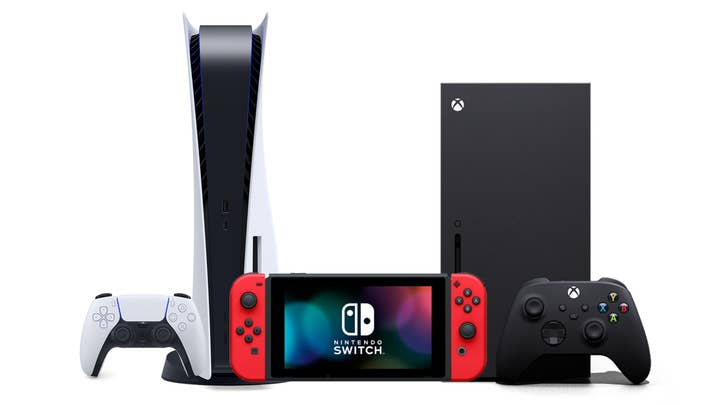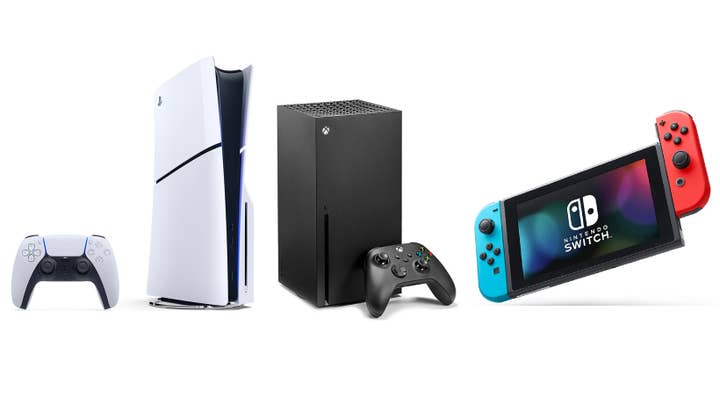Where is the console hardware market headed? | Opinion
A Switch successor may not appear until next year and Sony may be prepping a Pro model of the PS5; after a quiet 2024, console hardware looks set for a very busy 2025
Sign up for the GI Daily here to get the biggest news straight to your inbox
The past few weeks have seen almost endless discussion and speculation about Microsoft's future strategy and what it might mean for its role in the console hardware business – so much so that it's arguably overshadowed some broader questions about the console hardware market more generally.
We're in a very unusual place for hardware right now – still feeling the ripples and knock-on effects of the market distortions seen during the COVID-19 pandemic, even though direct effects like supply chain disruption are now behind us.
Those disrupted years have upset the rhythm of the game hardware cycle and left us with platforms whose public perception and sales are out of sync with their actual position in the cycle.
On the one hand, you have Nintendo's Switch – unquestionably an amazing device and a triumphant return to form for the company, but very clearly skidding up against the end of its lifecycle at this point. Nintendo has an astonishing ability to work around technical limitations that would be considered dealbreakers for any other company, but even that ability has limits.
It's increasingly hard to ignore how much the Switch is outperformed even by mid-range smartphones at this point
The inability to output 4K is less of a problem on a primarily handheld system, but it's increasingly hard to ignore how much the Switch is outperformed even by mid-range smartphones at this point, and Nintendo's flagship titles have left very few drops of blood to be squeezed out of this rock.
On the other hand, you have the PS5 and Xbox Series X, high-end consoles that are actually quite deep into their lifespans but which don't feel that way for many consumers, thanks to pandemic-era shortages which kept shelves bare (and scalpers wealthy) for years after launch. Many consumers seem to have been a little blindsided by recent discussion of when next-generation hardware will show up; to them, it feels like the current generation has barely started.
The situation is further complicated by the existence of Xbox Series S, which sold very strongly in the first few years after launch (not least because it was less supply-constrained than its more expensive sibling device) but is significantly underpowered compared to Series X and PS5.
This creates some well-telegraphed issues for developers as the previous generation somewhat belatedly fades into the rear-view mirror; perhaps more importantly, it also creates questions for Microsoft about how to hold on to its ownership of this competitive price point while realigning its hardware line-up in preparation for the next-generation launches that will presumably come in a few years' time.
The roadmap is quite unclear and more than a little bit confusing, but a couple of fairly credible rumours this week have added some new markers to that map – albeit still with a pencilled-in question mark next to them.
The first is that Nintendo's follow-up to the Switch, which had generally been assumed to be arriving in late 2024, may not actually appear until early 2025 – leaving the long-in-the-tooth Switch with another full year on the market as Nintendo's flagship device. The second is the suggestion that Sony has a PS5 Pro model in the pipeline for 2025, potentially launching ahead of GTA 6 in a bid to push people to upgrade to the latest hardware to enjoy Rockstar's long-awaited game.
That potentially leaves 2024 without the major console launch most people had expected – a further blow to a year that's already looking like a major lull
The first of those rumours is certainly credible – Nintendo could have decided to push its next console launch back into 2025 for any number of reasons, including uncertainty about the robustness of the supply chain (which is the core reason why we never saw an incremental Switch upgrade apart from the OLED display model) and wishing to give launch titles more development time.
Nintendo doesn't think about its hardware launches in the same way as the other two companies; its consoles are first and foremost a platform for its first-party software releases, and it's willing to hold off on releasing new hardware until it has high-quality software to go with it. That's also, in part, why we shouldn't expect a Switch successor to leap-frog the competition in terms of performance.
Nintendo's software focus also includes a focus on keeping its development costs in check, and working with lower-spec, tried-and-tested hardware is a significant advantage in that regard.
Nonetheless, that potentially leaves 2024 without the major console launch most people had expected – a further blow to a year that's already looking like a major lull for the business after the highs of 2023.

It also means 2025 is starting to look like a very busy year, which isn't a bad thing overall but does create a challenging degree of competition for customers' attention and wallets. That's further compounded by the possibility of a mid-generation spec bump for the PS5. The idea that Sony could have an upgraded model of the console ready next year isn't impossible by any means, and introducing new hardware to take advantage of the GT A6 launch would make great business sense – especially if they can ensure that Rockstar's game will be optimised for a Pro model console out the gate.
That's one of the few strategies that seems likely to give console sales a significant shot in the arm in the back half of the generation, potentially enough to allow Sony to push out its next generation launch a little further.
There are however some pretty big questions to be answered around the notion of a PS5 Pro model. Is this now Sony's standard console strategy – original model, 'slim' model, and eventually a Pro model in the back half of the generation? That feels like a familiar strategy already, but it's worth bearing in mind that the Pro model only appeared in the PS4 generation – prior to that, mid-generation refreshes would redesign the hardware and potentially add features like storage, but left the core specs of the system untouched.
The PS4 Pro existed for a very specific reason which, crucially, was very easy to explain to consumers. 4K TVs became very popular in the middle of that generation; the PS4 Pro supported 4K, while the original PS4 didn't. Thus, the PS4 Pro was the console for people who had upgraded to a 4K display. This was an easy thing for consumers to grasp, and it had the advantage of not making existing PS4 owners feel like they were losing out on very much; in theory, their console still did everything the PS4 Pro did, and they'd only need a Pro if they were to upgrade their TV.
What's the comparable case to be made for a PS5 Pro? I'm not denying that there's mileage in an upgrade to the console – this generation of consoles offered some fantastic upgrades (most notably the shift to solid-state drives), but it's running on GPU hardware that's already very dated and has thus found itself in an uncomfortable spot where raytracing is technically possible and looks pretty good, but turning it on requires sacrificing performance to an extent that's unacceptable to a lot of users in a fast-paced game.
The PS4 Pro existed for a very specific reason which, crucially, was very easy to explain to consumers... What's the comparable case to be made for a PS5 Pro?
The image quality gap between games' Graphics modes and their Performance modes has grown very wide in some cases; a PS5 Pro model which bridge that gap by giving the GPU enough horsepower to run current PS5 games' Graphics Mode visuals at Performance Mode framerates would be a major advantage that could give this hardware generation legs for a while longer.
How, though, do you explain this? There's no external factor like 4K displays driving the existence of such a spec bump. You're essentially launching a version 1.5 product, which at least some group of consumers will take as a tacit admission that your existing console doesn't run its games as well as it should or could.
I don't think that's insurmountable – consumers do understand that hardware specs advance over time – but starting to seed the expectation that PlayStation hardware will always get an upgraded version mid-cycle regardless of external factors like changes to display technology could have significant unwanted effects in the next generation.
"I'll wait for the Pro" sentiment kicking in within a couple of years of launch could be very damaging to sales at a crucial point in the console's lifecycle, especially since we can apparently no longer rely on regular hardware price drops as sales drivers.
Perhaps ironically given the discussions of the last few weeks, these rumours – if correct – could mean that Microsoft will actually have the only hardware launch of 2024, with a redesigned Xbox Series X model still reportedly in the pipeline for the end of the year. Where Microsoft's strategy goes from there remains an open question – the company seemingly no longer believes it can successfully mount a direct challenge to PlayStation's market dominance in hardware, but stepping away from that contest may actually give Microsoft latitude to explore more interesting concepts and directions for Xbox.
In conventional terms, Sony potentially adding a Pro to the line-up does feel like an opportunity to shift the Xbox line-up by pushing the Series X (or some variant of it) down to the Series S' position and adding a new device at the leading edge, but how that fits with Microsoft's current strategy is impossible to say.
All we know for now is that the console hardware market is going to become more complex, for companies and consumers alike – with a quiet 2024 likely to be the calm before the storm.









